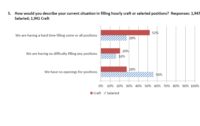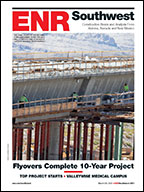...weeks of reduced output this spring. In a May 6 letter, Dow notified its customers that it was declaring force majeure for its MMA-based polymers, and therefore could allocate only 80% of its supply obligations through June 13, barring unforeseen events. Subsequent allocations will depend on manufacturing output.
“We began the process of bringing the plant back up over a week ago and are now running at full production rates,” Bentley reports.
Estimates of the degree and length of the MMA shortage vary, but Phillips says it could be the first quarter of 2011 before the situation is normal again.
“The shortages will also mean higher prices, in the range of 10 to 20%,” he adds.
Alternative types of paint are not readily available. Phillips says potential fallback solutions such as alkyd- and urethane-based emulsion systems don’t meet most highway department standards for weathering and appearance.
Even if transportation agencies decided to use these alternative products, “there’s currently not enough capacity to meet a sudden demand,” Phillips says.
Stimulus Spike in Paving Work
With stimulus-funded paving projects comprising a large share of the summertime construction schedule, highway agencies are scrambling to make do with what they can.
Kristi Jamison, Community Relations Coordinator for the Missouri Department of Transportation says her agency began seeing the shortage in May. “We’re still able to get paint, just not as much as usual,” she says.
MoDOT plans to control paint supplies from its central office, giving priority to projects with new surfaces and to keep markings on major roads in good condition.
“The effects are still controllable,” Jamison says. “We’ll just have to see what happens.”
Contractors also may be in a bind soon, adds AGC’s Deery. “Contractors are used dealing to with higher prices. But without supply, they may have to ask for extensions on their contracts.”
AGC hopes the Federal Highway Administration, the American Association of State Highway and Transportation Officials and the DOTs will develop a “contingency plan to ensure that critical highway construction projects can move forward safely to completion,” Deery says, “and that there are no negative ramifications for contractors, subcontractors or suppliers for events that are out of their control.”




Post a comment to this article
Report Abusive Comment